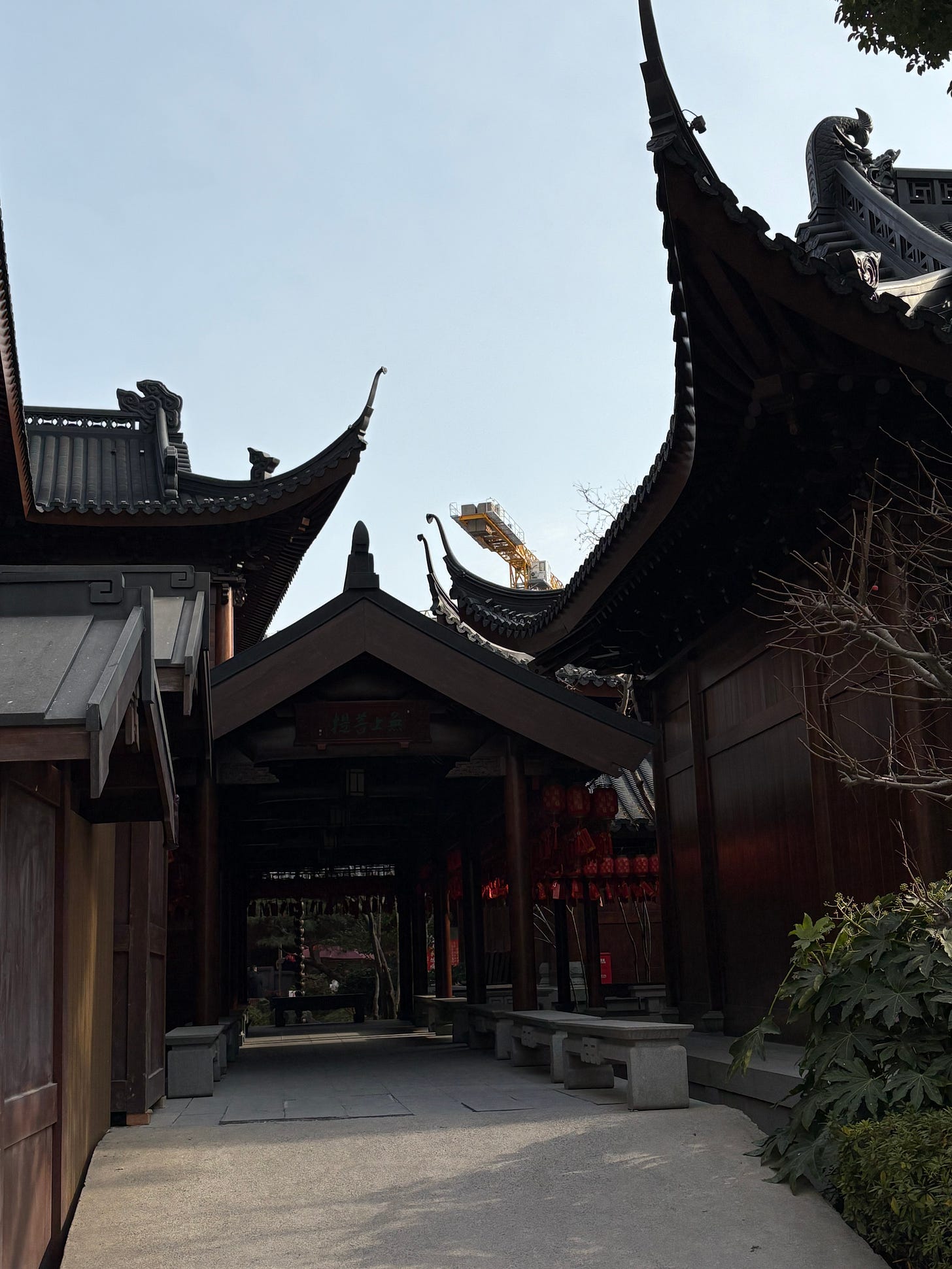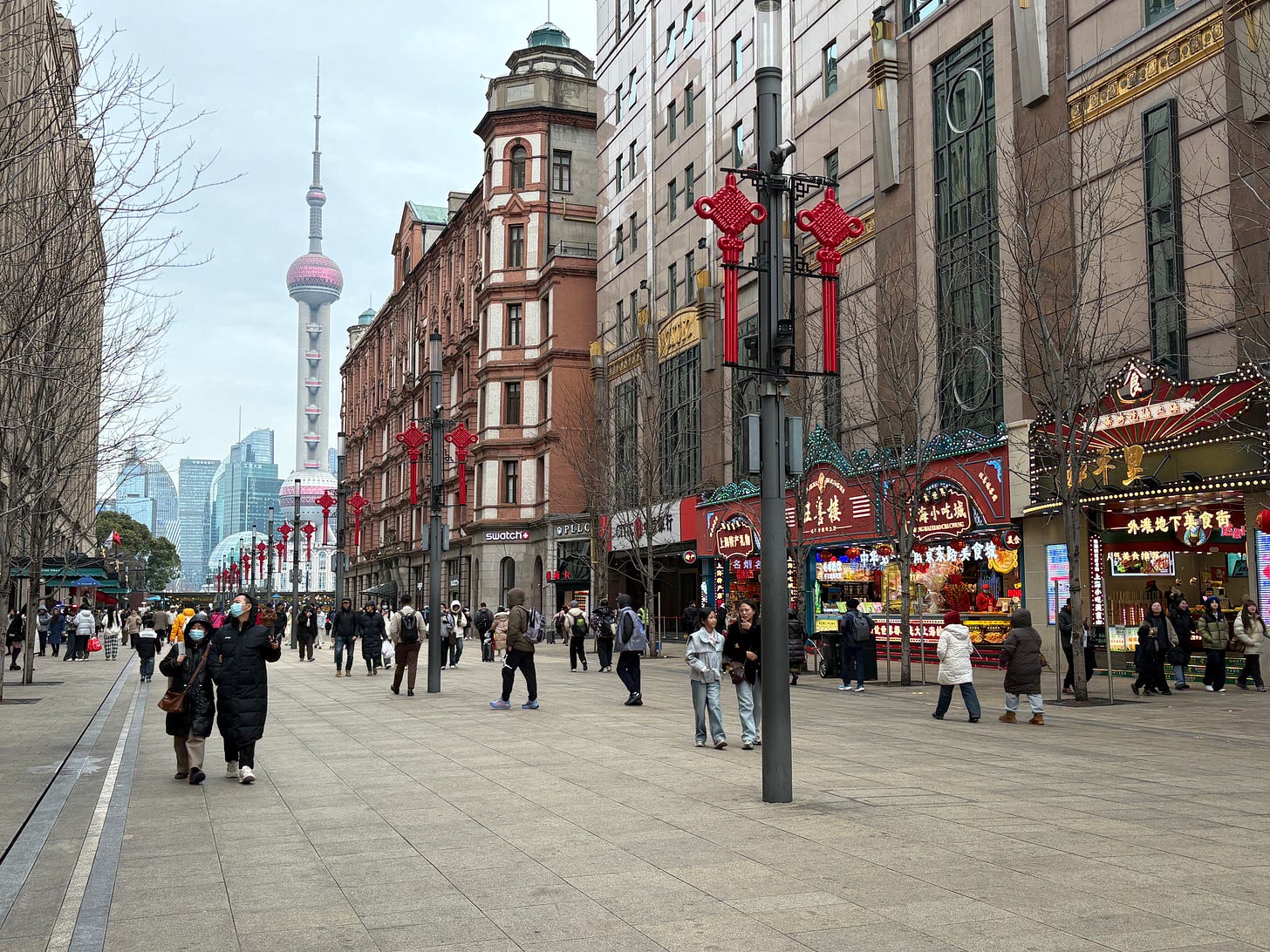I’m not entirely sure what I mean when I say ‘community,’ but it’s something I think about a lot these days, largely out of lack. I’ve had Casey Plett’s “On Community” on hold on Libby for months and I keep putting it back on the shelf when it becomes available in favour of reading the novels and essay collections that feel to me like friends. Literature, I believe, is a real way to expand and extend our felt communities farther than we otherwise could. That said, the company of books is no substitute for the company of intimate friends, or for shared language and values and culture.
Shanghai offers us a much lighter landing than most other Chinese cities would. By that I mean that it is navigable for someone who speaks no Chinese - much signage is written in both simplified Mandarin and English, for instance - and that there is an existing expat community for us to connect with, as well as many Chinese people who speak some amount of English. These things wouldn’t be available in smaller, less global cities. Still, building true community takes time. When D was out of town and I got sick, there was nobody I could call for help other than our nanny. She is amazing and someday soon I’ll write something more dedicated about the many aunties, paid and unpaid, who make our world here turn. This woman treats us like family, and I wouldn’t have made it through that week without her. At home, though, I would have been able to call on family members and friends for a deeper kind of support. In all likelihood I would not even have had to ask. I imagine my dear friend V leaving something she cooked, still steaming, in our Home Street front porch, as she often did when the omicron variant isolated us in the first two months of our parenting life.
Even the ability to talk to friends online, or via text, or on the phone, is radically different here. By noon our time, most of our friends from home have gone to bed. The latter half of our day is absent all communications with the people we love outside of the four of us.
No matter how deep our connections get, community here will always look different from the one we’ve built back home. The community I’ve grown in Winnipeg has been built through years of political pursuits, mutual growth, shared struggles, and community organizing. We can’t engage in most of those activities here, and I cannot always know the politics of my new friends. In some ways, that’s a good thing. It means I’m growing a community with a greater diversity of ideas and opinions that I can learn from. In other ways, it is difficult, because it means I’m sometimes unpleasantly surprised when a new friend espouses ideas that I think are harmful or unethical. Even when people don’t state these kinds of opinions, the superficially apolitical lives I see them living - which may not reflect their true values and beliefs - look to me like complacency and acceptance, especially when the people in question benefit from either political stasis or increasing conservatism.
We’ve been meeting people through our hobbies and career pursuits. D has met many wonderful people at NYU Shanghai, and he has a board game group he gets together with some Saturdays. I’ve enjoyed a string of casual Sunday brunches following scrimmages with the Shanghai Sea Dragons, the masters water polo team I practice with. I’ve begun to make friends through Inkwell, an organization that puts on regular writing workshops and retreats throughout Asia and beyond. These communities are highly transient, since many people end up living here because they work in fields that require them to move frequently. I can imagine a future in which we have people here who we can call in an emergency, but it will take a very long time to get to that point. We rely on paid support, and we value that a lot and try not to take it for granted, but it isn’t the same.
Of course, receiving support and care is only one part of what it means to be in community with someone, which is part of why having paid support is so different. I cannot offer my support and care in return, at least not in any significant way. I will know that I am in community with people when I am able to offer support to them in return. I’m not sure what this will look like here. There are few pragmatic acts I can offer that people here don’t already pay for. Sometimes I imagine myself to have so few practical skills that I am of no use to people - although of course my use of the word ‘use’ there is telling. We don’t use each other when we are in community. We lean; we ask; we commiserate; we take turns.
I do like to feel useful, though; it’s borrowed Catholic guilt, maybe, or just a universal human wish to be able to make something with my hands. Something concrete. The writing that I’ve been doing lately doesn’t go very far, and I am trying to be okay with that. Writing this blog helps me feel better connected, and like maybe I have some valuable things to share. I can see that I have made some true connections here in that I have friends who ask me midwifery-related questions. Birth work has always been an interesting subject of discussion for me because it opens an easy door into intimacy for so many people. It’s different now that I’m not working, but it has still given me a way to connect with people in the deeper way that I crave.
Finally, there are the things that communities can do when they come together. At its best, this kind of communal action is undertaken on the behalf of a community’s most vulnerable members, or in solidarity with another community at risk. This kind of community engagement is important to me, but it will have to wait until we live somewhere else again.







You know I love writing on community! It's so hard to build community when you move -- I imagine even moreso with the language barrier. But you've already built so much!